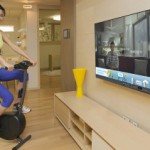Functional diversity and ICT for all

In July, the 25h, I had the honour of acting as the chair of a PhD defense tribunal. Dr. Carlos Rivas discussed about aging and online services for elder people through the television. His research was conducted by Dr. Luis Anido (who is a lecturer at UNIR, at the Master in Science of eLearning & Social Networks).
We might extend this discussion to any type of people with functional diversity, and not just the elderly ones. Anyone, anywhere, anytime, might require additional support for daily activities; providing services through a common piece of furniture (e.g. TV set) and a remote control, facilitates this support to every home.
Smart TVs, which might be connected to an Internet provided, and synchronised with the smartphone and other devices (e.g. tablets), seems to be the perfect tool for people of any age. Phones are powerful resources which would defeat any early desktop computer with a single button. However, they are sometimes messy for some users. A TV set brings normality to everyone. In doing so, every user can choose the perfect tool for him, and not just a fancy smartphone with too many tools and services (including the synchro services, hardly requested, and quite often installed by default, if one is not quick enough to stop them).
Nowadays, we often talk about Learning Analytics, Recommendation services and Personalisation of the user experience. These techniques and strategies provide a unique experience to every user, based on an uncountable amount of information, some of it directly provided by the user, some of it taken from the user with or without his explicit consent (unfortunately).
Functional diversity is not a commodity. It is not an additional feature that you might find or not, based on the good-willing of the manufacturer. Functional diversity is a must. We all need it. Or we will. To this extent, we can combine the top-level algorithm for analytics, with the top-level diversity requirements, to provide a top-level user experience, for all, and everyone.
Thanks to this research by Rivas and Anido we can implement these services in every home, with no painful disruption on the daily life of an end-user, if not requested. Technological progress is a powerful tool to help people, although it should not change people’s environment and habits drastically, if they do not want to. A subtle implementation can be equally effective, and using the TV as an additional facilitator looks like a right choice to make.
